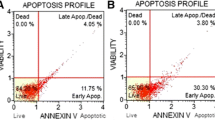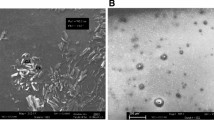Abstract
Ceramidases are key enzymes that decrease ceramide levels in cells. A reduction in ceramide concentration impairs ceramide signalling, and results in apoptosis resistance in cancer cells. This study investigates the potential for ceranib-2, a novel ceramidase inhibitor, to affect the survival and/or promote apoptosis of prostate cancer cells (LNCaP and DU145) in vitro. Cell viability was determined using MTT, and apoptosis assessed via flow cytometry. We examined structural changes with both confocal and transmission electron microscopes. Ceranib-2 concentrations of 0.1, 1, 5, 10, 25 and 50 μM were applied to LNCaP and DU145 cell lines. The corresponding reduction in LNCaP cell viability (against the control) was 84%, 80%, 64%, 56%, 40% and 15% after 24 h, and 81%, 74%, 60%, 55%, 27% and 11% after 48 h. For DU145 cells, viability was reduced to 84%, 82%, 63%, 50%, 41% and 18% after 24 h, and 64%, 42%, 30%, 20%, 8% and 5% after 48 h. Following treatment with 25 and 50 μM ceranib-2, the respective observed rates of early apoptosis in LNCaP cells were 23% and 36% after 24 h and 27% and 58% after 48 h. The morphological and ultrastructural signs of apoptosis detected were fragmented nuclei, chromatin condensations and cytoskeleton laceration. The inhibitory effects of ceranib-2 on prostate cancer cell survival are dose and time dependent. For LNCaP cells, ceranib-2 toxicity was predominately apoptotic in nature, while for DU145 cells, cell death may be related to non-apoptotic mechanisms.





Similar content being viewed by others
References
Beckham TH, Elojeimy S, Cheng JC, Turner LS, Hoffman SR, Norris JS, Liu X (2010) Targeting sphingolipid metabolism in head and neck cancer: rational therapeutic potentials. Expert Opin Ther Targets 14:529–39
Draper JM, Xia Z, Smith RA, Zhuang Y, Wang W, Smith CD (2011) Discovery and evaluation of inhibitors of human ceramidase. Mol Cancer Ther 10:2052–61
Engedal N, Saatcioglu F (2001) Ceramide-induced cell death in the prostate cancer cell line LNCaP has both necrotic and apoptotic features. Prostate 46:289–297
Gewies A, Rokhlin OW, Cohen MB (2000) Ceramide induces cell death in the human prostatic carcinoma cell lines PC3 and DU145 but does not seem to be involved in Fas-mediated apoptosis. Lab Invest 80:671–676
Holman DH, Turner LS, El-Zawahry A, Elojeimy S, Liu X, Bielawski J, Szulc ZM, Norris K, Zeidan YH, Hannun YA, Bielwska A, Norris JS (2008) Lysosomotric acid ceramidase inhibitor induces apoptosis in prostate cancer cells. Cancer Chemother Paharmacol 61:231–242
Huerta S, Gaulet EJ, Huerta-Yepez S, Livingston EH (2007) Screening and detection of apoptosis. J Surg Res 139:143–56
Kim YJ, Kim EA, Sohn UY, Yim CB, Im C (2010) Cytotoxic activity and structure activity relationship of ceramide analogues in Caki-2 and HL-60 cells. Korean J Physiol Pharmacol 14:441–447
Liu X, Cheng JC, Turner LS, Elojeimy S, Beckham TH, Bielawska A, Keane TE, Hannun YA, Norris JS (2009) Acid ceramidase up-regulation in prostate cancer: role in tumor development and implications for therapy. Expert Opin Ther Targets 13:1449–58
Mimeault M, Pommery N, Wattez N, Bailly C, Henichart JP (2003) Anti-proliferative and apoptotic effects of anandamide in human prostatic cancer cell lines: implications of epidermal growth factor receptor down regulation and ceramide production. Prostate 56:1–12
Mossmann T (1983) Rapid colorimetric assay of cellular growth and survival: application to proliferation and cytotoxicity assay. J Immun Method 65:55–63
Norris JS, Bielawska A, Day T, El-Zawahry A, Elojeimy S, Hannun YA, Holman D, Hyer M, Landon C, Lowe S, Dong JY, Mckillop J, Norris K, Obeid L, Rubinchik S, Tavassoli M, Tomlinson S, Voelkel JS, Liu X (2006) Combined therapeutic use of AdGFPFasL and small molecule inhibitors of ceramide metabolism in prostate and head and neck cancers: a status report. Cancer Gene Ther 13:1045–51
Ogretmen B, Hannun YA (2004) Biologically active sphingolipids in cancer pathogenesis and treatment. Nat Rev Cancer 4:604–16
Oskouian B, Saba J (2010) Cancer treatment strategies targeting sphingolipid metabolism. Adj Exp Med Biol 688:185–205
Proksch D, Klein JK, Arenz C (2011) Potent inhibition of acid ceramidase by novel B-13 analogues. J Lipids 20011:1–8
Ravindran J, Prasad S, Aggarwal BB (2009) Curcumin and cancer cells: how many ways can curry kill tumor cells selectively? AAPS J 11:595–610
Realini N, Solorzano C, Pagliuca C, Pizzirani D, Armirotti A, Luciani R, Costi MP, Bandiera T, Piomelli D (2013) Discovery of highly potent acid ceramidase inhibitors with in vitro tumor chemosensitizing activity. Sci Rep 8:3. doi:10.1038/srep01035
Saad AF, Meacham WD, Bai A, Anelli V, Elojeimy S, Mahdy AE, Turner LS, Cheng J, Bielawska A, Bielawski J, Keane TE, Obeid LM, Hannun YA, Norris JS, Liu X (2007) The functional effects of acid ceramidase overexpression in prostate cancer progression and resistance to chemotherapy. Cancer Biol Ther 6:1455–60
Samsel L, Zaidel G, Drumgoole HM, Jelovac D, Drachenberg C, Rhee JG, Brodie AMH, Bielawska A, Smyth MJ (2004) The ceramide analog B13 induces apoptosis in prostate cancer cell lines and inhibits tumor growth in prostate cancer xenografts. Prostate 58:382–393
Samuel RD, John TI (2002) A history of prostate cancer treatment. Nat Rev Cancer 2:389–96
Seelan RS, Qian C, Yokomiza A, Bostwick DG, Smith DI, Liu W (2000) Human acid ceramidase is overexpressed but not mutated in prostate cancer. Genes Chromosomes Cancer 29:137–46
Selzner M, Bielawska A, Morse MA, Rudiger HA, Sindram D, Hannun YA, Clavie PA (2001) Induction of apoptotic cell death and prevention of tumor growth by ceramidase analogues in metastatic human colon cancer. Cancer Res 61:1233–40
Stiban J, Fistere D, Colombini M (2006) Dihydroceramide hinders ceramide channel formation: implications on apoptosis. Apoptosis 11:773–780
Strelow A, Bernardo K, Klages SA, Linke T, Sandhoff K, Kronke M (2000) Overexpression of acid ceramidase protects from tumor necrosis factor-induced cell death. J Exp Med 192:601–11
Vejselova D, Kutlu HM, Kuş G, Kabadere S, Uyar R (2014) Cytotoxic and apoptotic effects of ceranib-2 offering potential for a new antineoplastic agent in the treatment of cancer cells. Turk J Biol 38:916–921
Acknowledgements
This study was supported by a grant (project number: 1401S007) from Anadolu University Scientific Research Projects Committee.
Author information
Authors and Affiliations
Corresponding author
Additional information
Editor: Tetsuji Okamoto
Rights and permissions
About this article
Cite this article
Kus, G., Kabadere, S., Uyar, R. et al. Induction of apoptosis in prostate cancer cells by the novel ceramidase inhibitor ceranib-2. In Vitro Cell.Dev.Biol.-Animal 51, 1056–1063 (2015). https://doi.org/10.1007/s11626-015-9932-9
Received:
Accepted:
Published:
Issue Date:
DOI: https://doi.org/10.1007/s11626-015-9932-9




